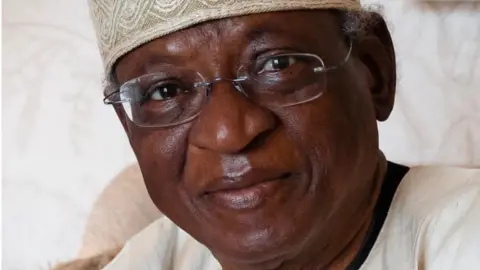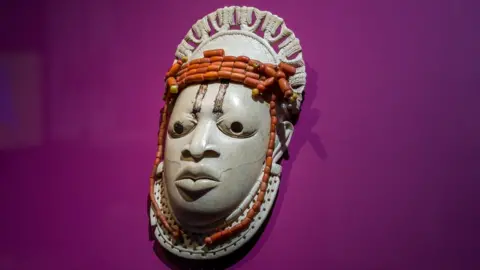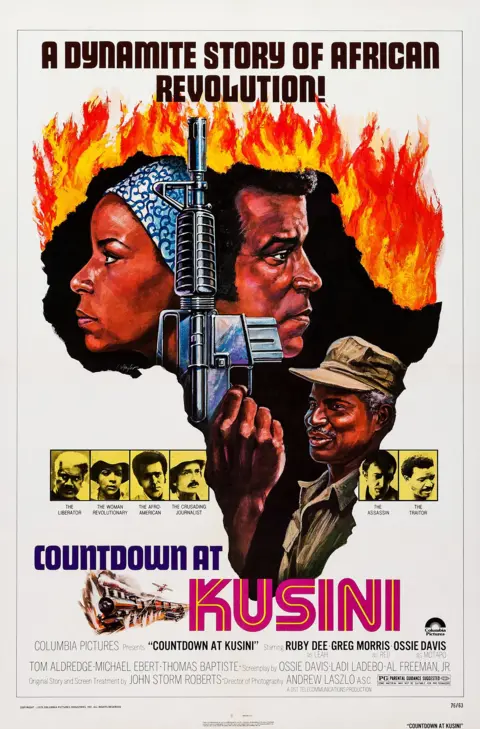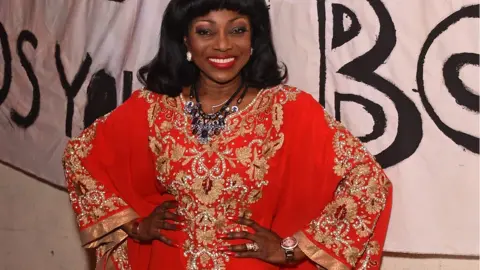Ladi Ladebo: A pioneer of Nigerian cinema
 Ladebo family
Ladebo familyFilmmaker Ladi Ladebo, who has died aged 78, was one of the pioneers of Nigerian cinema in the celluloid-era optimism of the 1970s, and wrote the screenplay for one of the most important black films ever made.
His death in London came nearly 20 years after his last directorial effort, Heritage. The film had its UK premiere at the Khalili Theatre of the School of Oriental and African Studies (Soas) in 2004.
Centred on the trade in African artefacts fuelled by the international art market, the film feels prescient in light of the current debate about the restitution of African art treasures from museums of the West.
Ladebo felt strongly about the issue, comparing looted African art to someone stealing the Statue of Liberty.
He argued that the loss of artefacts had an adverse impact on societal cohesion, as the objects were made for cultural purposes and their absence could only be detrimental, due to the removal of vital information pertaining to a people's journey.
He did not spare the Nigerian elite in what he called the "social crisis" of art theft, pointing to acts of complicity in the illicit trade.
He was similarly unimpressed by African governments, which he accused of lacking seriousness about arts and culture, decrying their failure to accord museums their proper place in the education system.
 Getty Images
Getty ImagesLadebo believed a realistic outcome for Nigeria would be part-return or part-purchase arrangements with Western museums. He further suggested periodical travelling exhibitions that would allow people to see the artefacts in their homeland.
But the ground has since shifted significantly. The debate over the Benin Bronzes has reached unprecedented levels, and developments are unfolding which might have seemed unthinkable a couple of years ago.
Germany is to return looted Benin Bronzes to Nigeria; so is the University of Aberdeen as well as several institutions, especially museums, from the UK to Europe and America.
In the current atmosphere, it is reasonable to think that Ladebo, too, would be much more strident today in his reckoning of an issue that preoccupied him so much he made a film about it, pumping much of his family savings into the project.
The director and producer had hoped to work with Swiss backers to make a series of documentaries titled, Who Owns Art and Culture? However, it does not appear anything came of the arrangement.
Heritage suffered the fate of much of his filmography - made with passion and idealism but seen by few.
'Blaxploitation'
Born Raymond Oladipupo Ladebo in the city of Ijebu-Ode in Nigeria's Ogun State, the director obtained business and marketing degrees from US universities, and worked as a media analyst and accounts executive before going into films in collaboration with African-American actor Ossie Davis, who described Ladebo as a son-in-law.
Their greatest collaboration was on the film Countdown At Kusini (1976), co-written by Ladebo and directed by Davis, who also starred in the film alongside Ruby Dee.
 Getty Images
Getty Images
Countdown At Kusini was the first of its kind in many ways, and its unique place in the history of black cinema is now an acknowledged fact.
"The first film to be made by Black Americans and Africans working together on African soil, Kusini gives us a rare glimpse of the modern reality of Africa. All film was done in and around Lagos, Nigeria," noted the US newspaper, Ann Arbor Sun, in 1976.
A conscious Pan-African production conceived to counter stereotypical portrayals of African Americans particularly in the Blaxploitation films of the early 1970s, Kusini was the first film ever to be funded by a black women's organisation, the Delta Sigma Theta Sorority, in a case of crowdfunding and media activism that was ahead of its time.
But for all the good intentions, Kusini's backers had not banked on non-committal Hollywood distributors and theatres, as the film was pulled summarily from the cinema by Columbia Pictures.
When Kusini was shown at the Diaspora Festival of Black and Independent Film in the US in 2018, it was its first screening in 30 years.
Many older Nigerians fondly remember Ladebo's iconic film, Bisi - Daughter of the River (1977), a vehicle for British-Nigerian actress, Patti Boulaye, in the high point of Nigerian cinema.
 Getty Images
Getty ImagesThe economic downturn and Structural Adjustment Programme (SAP) of the 1980s led to a steep decline in Nigeria's cinema culture.
By the time another generation rose to build a new Nigerian movie industry from the ashes in the 1990s, it would be reborn as video films.
The new practitioners, in what would become known as Nollywood, were moving away from the practice and aesthetics of the likes of Ladebo, taking the audience with them.

You may also be interested in:

As he told the BBC's Masterpiece programme in 2005, Ladebo admired the ingenuity of the early Nollywood marketers in cracking the problem of distribution, but he never cast his lot with the video film industry.
Celluloid, he said, was "cleaner and requires a different discipline." Heritage was shot in 16mm. No doubt, he was also cautious about access to his films because of the scourge of piracy in the Nigerian film distribution chain.
After 1977, he stuck to making what he called advocacy films, usually in collaboration with funder organisations such as the United Nations Educational, Scientific and Cultural Organization (Unesco) and the UN Population Fund (UNPFA).
His 1992 production, Vendor, won four awards, including Best Director and Best Feature at the first Nigerian Film Festival in the same year.
Ladebo was among the very last of the visionary directors of Nigeria's early big-screen era, and was an important bridge between the different incarnations of the country's film industry - from celluloid to video and digital.
He is survived by his wife, Irene, three daughters and two grandchildren.
